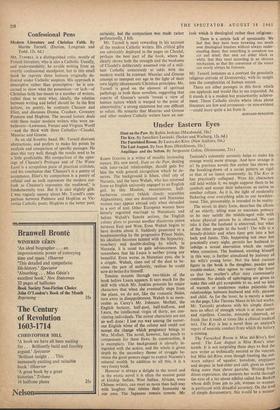Confessional Pens
MR. TURNELL is a distinguished critic. mostly of French literature, who is also a Catholic. Usually, and understandably, he avoids writing from an overtly confessional standpoint, but in this small book he reprints three lectures originally de- livered under Catholic auspices. His approach is descriptive rather than prescriptive: he is con- cerned to show what the possession—or lack—of Christian faith has meant to a number of writers, rather than to state what, ideally, the relation between writing and belief should be. In the first lecture, on poetry, he contrasts Chaucer and Eliot, and discusses Donne, Crashaw, Coventry Patmore and Hopkins. The second lecture deals with three major modern writers who were un- believers—Lawrence, Forster and Virginia Woolf —and the third with three Catholics—Claudel, Mauriac and Greene.
As an old Scrutiny hand, Mr. Turnell distrusts abstractions, and prefers to make his points by analysis and comparison of specific passages. He does this very well, though the results tend to be a little predictable. His comparison of the open- ings of Chaucer's Prologue and of The Waste Land is a scrupulous piece of practical criticism, and his conclusion that 'Chaucer's is a poetry of acceptance, Eliot's by comparison is a poetry of refusal and as such represents the modern out- look as Chaucer's represents the medimval,' is fundamentally true. But it is also slightly glib. I was vaguely uneasy about Mr. Turnell's com- parison between Patmore and Hopkins as Vic- torian Catholic poets; Hopkins is the better poet,
certainly, but the comparison was made rather perfunctorily, I felt.
Mr. Turnell is most rewarding in his account of the modern Catholic writers. His critical gifts are admirably deployed in the pages on Claude!, perhaps the best part of the book, where he clearly shows both the strength and the weakness of Claudel's deliberately assumed role of a mili- tant Catholic consciously at odds with the modern world. In contrast, Mauriac and Greene attempt to interpret our age in the light of their own highly idiosyncratic Christian principles. Mr. Turnell is good on the element of spiritual pathology in both these novelists, suggesting that aspects of Greene's novels 'reveal a view of human nature which is warped to the point of abnormality,' a strong statement but one difficult to refute. He remarks that Mauriac and Greene and other modern Catholic writers have an out- look which is theological rather than religious:
There Is a certain lack of spontaneity. We feel that they have been browsing too much over theological treatises without always under- standing them; that everything is somehow too cut and dried; that men are either black or white, that they react according to an obvious mechanism, so that the conversion of the sinner can nearly always be foreseen.
Mr. Tunnel' instances as a contrast the genuinely religious attitude of Dostoievsky, with its insight into the complexities of human nature.
There are other passages in this book which one applauds and would like to see expanded. As it stands it is a modest but praiseworthy achieve- ment. Those Catholic circles where ideas about literature are few and erroneous—or non-existent —could learn quite a lot from it.
BERNARD BERGONZI






























 Previous page
Previous page